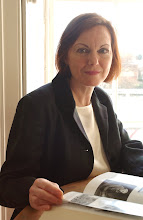
 Following my blog entry, Wesleyan Methodists emigrate to the Cape of Good Hope, Rodney Jones contacted me from Randburg, South Africa. He wrote: 'One of my wife's distant ancestors has links to Bloomsbury.
Following my blog entry, Wesleyan Methodists emigrate to the Cape of Good Hope, Rodney Jones contacted me from Randburg, South Africa. He wrote: 'One of my wife's distant ancestors has links to Bloomsbury.James Hancock (top picture) was born on 1 May 1776 in Newcastle-under-Lyme, Staffordshire, England. He married Ann Kennedy (b. 1790, picture above) on 21 February 1808 at the Church of St George the Martyr, Bloomsbury. Ann was a Londoner, born in Bride Lane, in the City. James and Ann were two of the 1820 Settlers to South Africa, part of Hezekiah Sephton's party in the ship Aurora (344 passengers). They departed from London on 15 February 1820, and arrived at Simon's Bay on 1 May 1820. They arrived at their final destination of Algoa Bay, Cape Colony, on 15 May 1820.
James Hancock was a china painter. He founded an art school in Grahamstown. James Hancock was a Wesleyan lay preacher. In 1833, he had a street named after him (Hancock Street) in Port Elizabeth.
He died on 20 August 1837, in Port Elizabeth, Cape Colony. He is buried in the Old Settler Cemetery, South End, Port Elizabeth, South Africa.
Any further information about James Hancock would be of great interest to me.'
Hezekiah Sephton, who led the emigrating party, was a carpenter of 1 Bedford Court, Red Lion Square, Bloomsbury. He and other members of the group seem to have been members of the Great Queen Street Wesleyan Methodist Chapel, which was just over the Bloomsbury border in Holborn. They formed themselves into the United Wesleyan Methodist Society, with a committee responsible for the organisation of the party. The selection of the clergyman was put in the hands of the committee of the General Wesleyan Methodist Missionary Society, whose choice fell on the Rev William Shaw. Read more about this journey by clicking on the link to Hezekiah Sephton.
